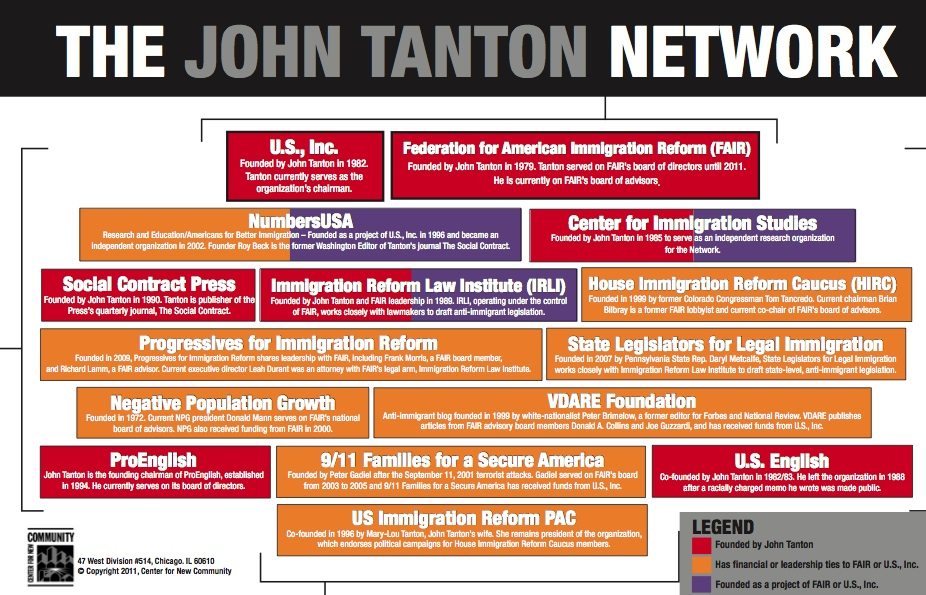I will place updates here. Follow me on Facebook or on Twitter @HMAesq for notifications.
Background
As an immigration lawyer, in the wake of ICE raids, stalled immigration reform, detention of children, denial of due process, ramped up deportations, and targeted travel bans, I am committed to stop what I see as the legalization of xenophobia which will have the effect of creating a permanent and disenfranchised underclass.
I believe there is a purposeful and intentional movement to achieve that nefarious goal, to which there must be a purposeful and intentional response, and to thwart against which there should have been a purposeful and intentional movement.
There have been various anti-immigrant, exclusionary policies pushed over the past 15 years. Behind modern players like Kris Kobach, Dan Stein, Kellyanne Conway, Otis Graham, Steve Bannon, and others in the new administration is the trifecta of anti-immigrant organizations: FAIR, NumbersUSA, and CIS. Like any organization, there have been lots of hands stirring the pot for a very long time. But sometimes, you can find a lynchpin. I believe one such lynchpin behind all three of these organizations is one man: John Tanton.
Dr. Tanton is best described as an environmentalist turned immigration restrictionist, and someone at least sympathetic to white nationalism. The groups he founded and/or nurtured – FAIR, CIS, NumbersUSA, and other ones such as US Inc. and US English have collectively stalled meaningful immigration reform for decades. Kris Kobach is of counsel to the legal arm of FAIR. The former executive director, Julie Kirchner, is now the ombudsman of USCIS. FAIR’s writeups strongly influence immigration policy, as in the case of the administration’s “Declined Detainer Outcome Report.” The list goes on.
These organizations inform US immigration policy, and Dr. Tanton was the grand wizard behind them. Bans, raids, private prisons, deportation as a cure-all, fanning hate of refugees and immigrants? Much of it traceable back to FAIR and, ultimately, Dr. Tanton.
The Tanton Papers
Tabnton was a prolific writer, thought leader, and connector. He has been suffering from Parkinson’s and is apparently retired from public life, but his thought lives on.
His papers from 1960 to 2007 were donated to the University of Michigan’s Bentley Historical Library and are currently located in 25 boxes. Boxes 1–14 are open without restriction, but boxes 15-25 are closed until April 6, 2035.
The modern version of Tanton’s thought is becoming White House immigration policy. I believed the public interest is served by investigating that connection. That means unsealing boxes 15-25.
What’s in the Sealed Tanton Papers? According to the BHL, among other things:
- Meeting minutes of FAIR from its inception in 1979
- Nine folders labelled “Pioneer Fund” (a group founded to promote the genes of white colonials that funds studies of race, intelligence and genetics)
- Voluminous folders on immigration, including state-specific tomes
- Information on various other organizations including CIS, IRLI (to which Kobach has been of counsel for many years)
- Dr. Tanton’s private correspondence
In short, the sealed Tanton papers may shine a light onto the conceptual foundations of the anti-immigrant movement, as well as its strategic plans and key players. It may help us understand the origins of the groups currently informing White House immigration policy, and how the thought evolved from Tanton’s environmental concerns to the policies we’ve seen in 2017, including the Muslim bans, ICE raids, and ramped up enforcement.
The FOIA Action
On December 16, 2016 I filed a Freedom of Information Act (FOIA) request with the University of Michigan. As expected, the University requested additional time. Eventually they responded, asking for a deposit to cover one-half of the estimated FOIA expenses.
The Southern Poverty Law Center and the Michigan chapter of the Council on American-Islamic Relations both recognized the importance of transparency here. The SPLC has been reporting on the Tanton hate networks for decades.
I sent in the money to the University, but on May 8, 2017 my request was denied. The University took the position that since the records were sealed, they were not “public records” within the meaning of the Michigan Freedom of Information Act.
I filed an appeal with the President of the University of Michigan on May 16, 2017. I argued that under binding Michigan Supreme Court precedent, the documents still were public records retained by a public body for an official purpose. The presence of some mysterious arrangement to seal the documents was simply apropos. I sent in a draft lawsuit, indicating my intent to avail of judicial process if the denial was not overturned.
On May 30, 2017, the President denied my appeal. Counsel for the President Liz Barry wrote the sealed papers were restricted due to a valid charitable gift agreement, and failure to abide by that agreement would chill potential future donors from donating key historical papers, undermining the University’s essential function to preserve that history.
Having exhausted all options with the University, on Monday, June 5, 2017 I filed a lawsuit against the University seeking an order compelling production of the Sealed Tanton Papers.
I believe the records are public records, that a public body like the University of Michigan, Ann Arbor cannot unilaterally insulate records from the Freedom of Information Act simply by private agreement, and that in any case, the public interest on these facts trumps whatever privacy or other interest may suggest against disclosure.
***
Hassan Ahmad, Esq., is an immigration lawyer in Northern Virginia and has spent time volunteering at Washington-Dulles International Airport in the wake of Trump’s travel bans, as well as being a vocal opponent of the administration’s deportation policies. He tweets from @HMAesq.



